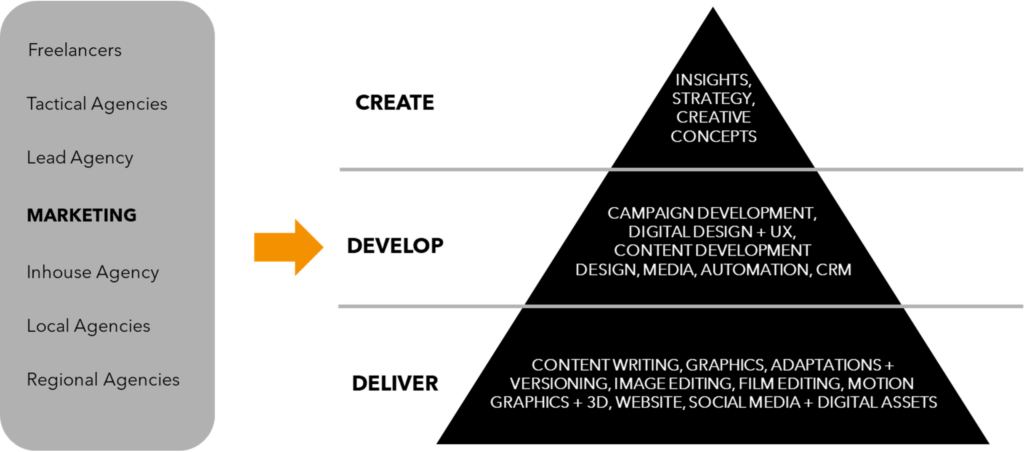Back in the early 2000s, Daft Punk’s electronic dance hit urged us to, “Work it harder, make it better. Do it faster, makes us stronger.” At around the same time, the IPA, ISBA and CIPS embarked on the initiative that became Magic + Logic and redefined sustainable business practices for marketing agencies and procurement.
Coincidence? Well, yes. (I’d like to think that the framers of Magic & Logic had Daft Punk on heavy rotation at the time.) But even after two decades, this ethos remains relevant to marketing procurement professionals everywhere as we continue to search for ways to get the best out of each other in a constantly evolving industry.
With brands, budgets, and resources under relentless pressure, exponential channel growth, and the rise of AI, what marketing represents to buyers is constantly changing. Through all of this, the need to create more work, both faster and cheaper, is a top priority, but the real challenge is to find profitable and sustainable models of growth for brands, businesses, and the people driving them.
So, what does all this mean for the marketing ecosystems of the future?
There is no fixed answer
Every organisation must have a marketing ecosystem that best suits their needs. With over 25 years of experience in optimising marketing setups at SPRING Production, we’ve come to appreciate this truth: there’s no magic formula or one-size-fits-all solution that caters to all
organisations. Ecosystems are complex, and complexity isn’t just linked to the relative size of the organisation – the needs of smaller or high growth organisations can be as demanding as larger, more mature ones. What there are, however, are a set of guiding lights that will help us find the answer, be it for marketing, procurement or the partner agencies.
All on the same page
The goals and KPIs of marketing and procurement departments need to be in sync. It’s important to remember that procurement isn’t just about cutting costs. There are times when procurement needs to step in and say, “We need to spend a bit more to get the quality and value we’re looking for.”
Taking an example from our own experience, we’ve been working with a client for a long time, and one thing was clear from the start: we could only take on additional work after we had hit specific cost-saving goals. By meeting these cost-saving targets, we were able to expand the scope of our work, fulfilling the shared vision of a cost-efficient ecosystem.
Commercial understanding
Marketing and procurement have much to learn from each other, especially regarding the key commercial factors that drive growth. Similarly, a partner agency that’s commercially focused on their own P&L shouldn’t be something that frightens marketing teams.
In the past, the common belief was that the more creative an agency partner, the less they focused on the commercial thinking. However, times have changed. The question now is, do your agency partners grasp the commercial needs that will fuel your future business growth? Can they assist you in meeting these needs, whether it’s through cost savings or setting up the correct reporting systems and measures right from the beginning, instead of as an afterthought?
A sustainable, fit for purpose ecosystem
Studies reveal that 80% of high performing procurement organisations differentiate between strategic and operational roles**. Category managers align themselves with marketing stakeholders through data that supports agile decision-making. Here, the strategic and operational aspects of the organisation function in perfect harmony.
To make that ambition a reality relies on a vital ingredient: data. Information and insights help category management teams develop smart strategies, identify a portfolio of value creation projects, and mature their categories over time. Such an approach creates sustainable value. Cost savings become a natural outcome, but not the objective – building a sustainable procurement model is the primary goal.
Change only comes one step at a time
It is hard to bring everyone along with you. So, think about the blockers and enablers in the ecosystem. Adopt a consultative approach that inspires those delivering change and helps overcome the opposition from those less inclined to accept it. In the business world, we often discuss the interplay between profit, purpose, and people. Remember, the first two elements are only achieved with the contribution of the third.
Outside looking in
Alongside this, it’s critical to introduce external stimulus to your teams – new ideas and inputs. Ask yourself, do your agency partners feedback on how your departments are being run? Could you benefit from seeing different processes and approaches in action? Can new technologies help support them now and in the future? Is it possible to bring in this expertise on an ad hoc basis?
Know the layers to the marketing pyramid
The tried and tested structure (see graphic) reflects the different parts of the marketing ecosystem, starting with strategic and creative at the top, through development and sell-in, down to adaptation and production. The pyramid shape is deliberate – while all the focus (and often cost) is placed at the top, the true value of the work is shaped by what transpires at the base during the production phase. This crucial aspect is frequently overlooked.
So, what changes are necessary to optimise this system for your business growth objectives? Begin with the easy fixes, which are usually found at the production stage. With the right setup, these adjustments can provide immediate benefits, ranging from cost savings to complete transparency, scalability, and flexibility to balance the ups and downs in the marketing cycle.
Keep in mind, the ecosystem model you choose is just the starting point, not the final destination. It will evolve as demands and influences shift. To monitor progress or detect when a change is needed, establish a set of benchmarks from the outset.

Summary
The above only offers a glimpse into the complex topic of achieving a harder, better, faster, stronger marketing ecosystem.
SPRING Production will delve deeper into this theme and more at the ProcureCon Marketing Europe event, taking place in London from 6th to 8th June 2023. If you’re lucky enough to attend, we invite you to participate in our panel discussion on the afternoon of the first day.
Alternatively, follow us on LinkedIn to access additional insights on the subject that will empower you to design, cultivate, and implement the optimal marketing ecosystem for your organisation.
** Harvard Business Review, Procurement as an Ecosystem, April 2020
Should you have forgotten about Daft Punks hit from 2001, you can relive it here.
About the author
Austen Donnellan, Business Development Director, UK
Austen has worked for over 25 years with some of the leading brands and business across the UK and Europe, helping them devise and develop winning strategies and approaches to how they deliver their marketing, from campaign development through to production, optimising the performance and remuneration model and getting the best out of the client and agency teams.
Get in touch


